As part of NISM’s ongoing commitment to promoting financial literacy and inclusion, a structured Financial Literacy Series was launched for students of partner Higher Education Institutions (HEIs). This initiative comprised five Online Student Development Programmes (SDPs), each focused on a key theme in personal finance and investment awareness. Conducted between May and June 2025, the series aimed to build foundational knowledge and practical skills among students, covering topics such as budgeting, investment planning, debt management, fraud prevention, and operational aspects of investing. Delivered by experienced resource persons, the sessions fostered informed financial behaviour and digital financial awareness in young learners.
SDP 1: Personal Finance Concepts
Date: 20–21 May 2025 | Speaker: Ms. Shilpa Wagh, Adjunct Faculty– NISM
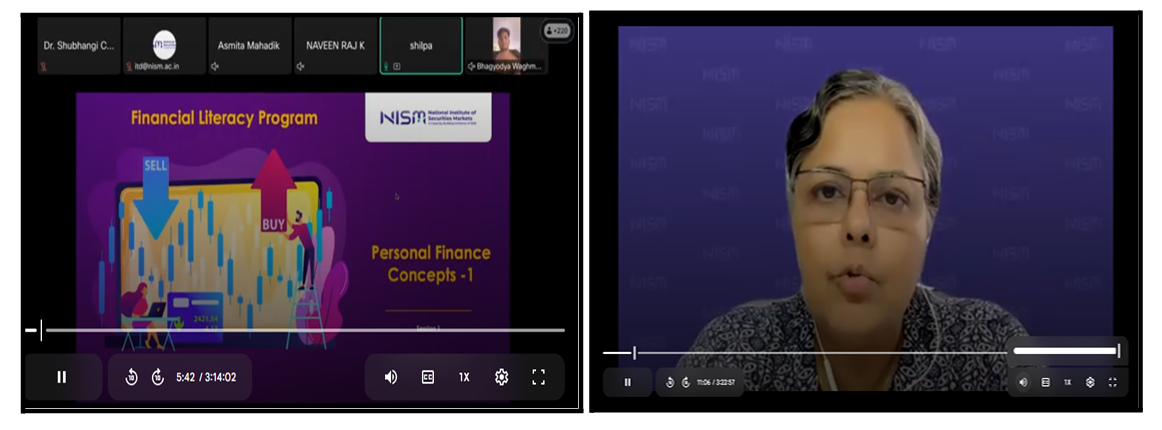
The first SDP introduced students to the fundamentals of personal finance, emphasizing its role in life planning. Sessions covered the importance of financial discipline, budgeting, saving, and creating an emergency fund. Through interactive modules, students explored the time value of money, power of compounding, and behavioral finance biases that impact decisions. Hands-on practice with budgeting tools and personal finance apps added practical value. This session laid a strong foundation for financial independence and responsible money management, especially designed to instill confidence in handling day-to-day and long-term financial needs.
SDP 2: Asset Classes & Goal-Based Investment Planning
Date: 27–28 May 2025 | Speaker: Ms. Shilpa Wagh, Adjunct Faculty– NISM
This SDP focused on demystifying investment concepts by introducing various asset classes such as equity, debt, gold, and real estate. It emphasized investor risk profiling and the importance of aligning investments with SMART financial goals. Students learned how inflation affects savings and the need for asset allocation and portfolio rebalancing. A highlight was the hands-on activity where participants built their own goal-based investment plans. The session empowered students to make informed, goal-oriented investment choices by understanding the risk-return trade-offs associated with different financial instruments.
SDP3: Debt Management
Date: 3–4 June 2025 | Speaker: Ms. Shilpa Wagh, Adjunct Faculty– NISM
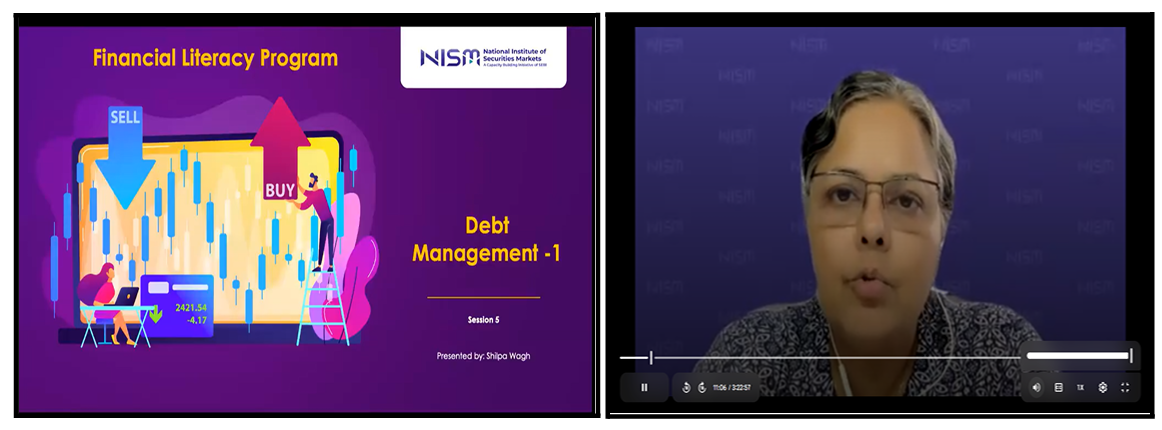
The third session addressed the critical topic of managing debt effectively. Students explored types of debt—good vs bad—and learned about credit cards, loans, and EMI calculations. The concept of credit scores and their significance in financial credibility was emphasized. Debt repayment strategies like the snowball and avalanche methods were discussed in detail. Interactive roleplay exercises allowed students to simulate debt scenarios and apply repayment techniques. This SDP helped participants understand the long-term impact of borrowing and develop strategies to manage and reduce personal debt responsibly.
SDP4: Safeguard Your Money– Financial Frauds & Cybercrime
Date: 10–11 June 2025 | Speaker: Mr. Amit Trivedi, Adjunct Faculty– NISM
In an increasingly digital financial environment, this SDP trained students to recognize and safeguard against various types of frauds. Topics included cyber threats like phishing, vishing, and SIM swaps, as well as offline scams. The importance of digital hygiene and secure banking practices was underlined. Students were taught how to report fraud through SEBI, RBI, and cyber cells. Real-life case studies and interactive quizzes helped participants identify red flags and adopt preventive measures. The session aimed to build vigilance and digital literacy for safer financial transactions.
SDP5: How to Start Investing–Operational Aspects
Date: 17–18June2025| Speaker: Mr.Amit Trivedi, Adjunct Faculty–NISM
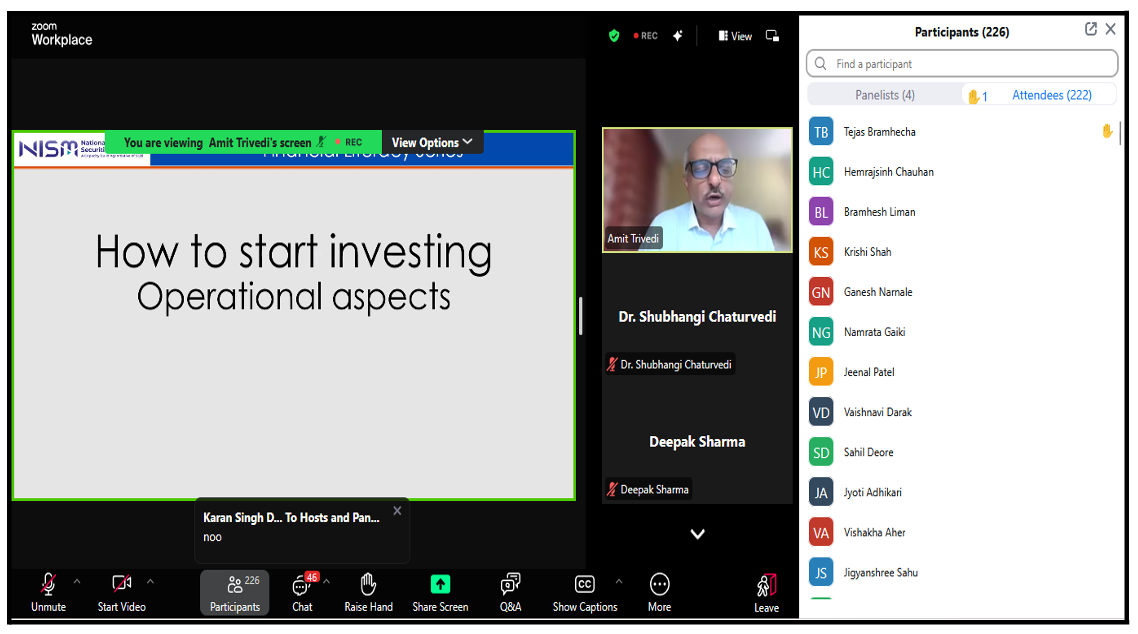
The final SDP provided a practical guide to starting investments. Participants were introduced
to the KYC and account-opening processes required for Demat , trading, and banking. The
session demonstrated how to use investment platforms, place different order types, and
understand basic taxation concepts like capital gains and Section 80C benefits. Students also
learned to track and monitor their portfolios using digital tools. The hands-on approach and
live demos simplified the complexities of investing, enabling students to confidently initiate
their investment journeys.
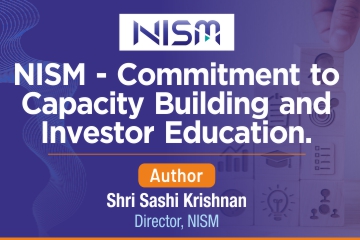
For NISM, 2025 was defined by a renewed commitment to capacity building and investor education. Anchored by our mandate from…
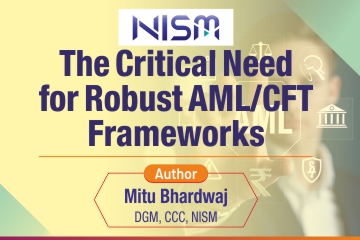
The threats of money laundering (ML) and terrorist financing (TF) have grown exponentially due to the increasingly interconnected nature of…

One thing we all love is speed. We love it when groceries are delivered in 10 minutes, we want to…
© 2026 National Institute of Securities Markets (NISM). All rights reserved.